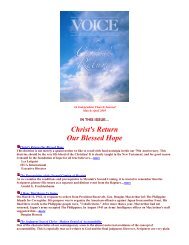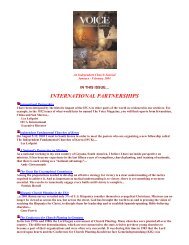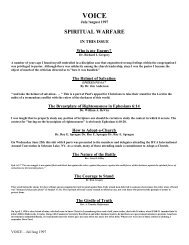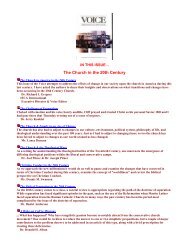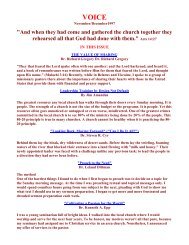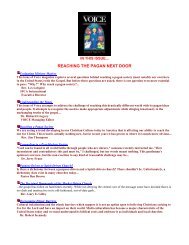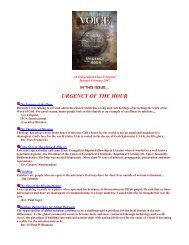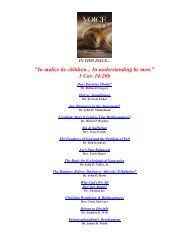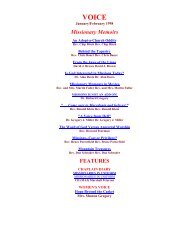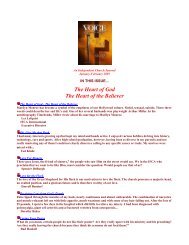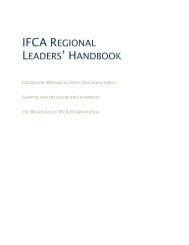The Joyful Burden
The Joyful Burden
The Joyful Burden
You also want an ePaper? Increase the reach of your titles
YUMPU automatically turns print PDFs into web optimized ePapers that Google loves.
that as we are yoked to Him, we learn the gentleness and humility that characterize Him. And in<br />
so doing, we find rest for our souls.<br />
Second, Jesus says that His yoke is easy and His burden is light. That word translated "easy" is<br />
elsewhere translated in the New Testament "good" and "gracious" and "kind." It is important to<br />
note that the Lord Jesus is not promising to remove all of our burdens. But He does promise to<br />
provide His good, gracious, and kind strength to do His will while we are in His yoke. <strong>The</strong>re will<br />
be burdens, but by His enablement we can bear those burdens. <strong>The</strong>y will seem "light."<br />
Those of us in ministry must remember that Jesus' yoke is a joyful burden. While we acknowledge<br />
there are burdens involved in ministry, those burdens will be shared by the Lord Jesus as we<br />
labor together with Him. <strong>The</strong>re are four words in the Bible that describe some of the burdens in<br />
ministry.<br />
Mas´´sa: A <strong>Burden</strong>some Message<br />
No one likes to be told what we don't want to hear. Yet sometimes it is the pastor's duty to deliver<br />
the unpopular message. <strong>The</strong> results can be extremely burdensome. This was familiar to the Old<br />
Testament prophets who had a "burden from the Lord": they were commanded to deliver harsh<br />
messages of rebuke they did not desire to give and the people did not desire to receive. <strong>The</strong> word<br />
mas´´sa is used 27 times in Old Testament prophetic contexts regarding severe announcements of<br />
judgment from the Lord (<strong>The</strong>ological Wordbook of the Old Testament, Volume 2, page 602). Each<br />
time it is translated "a burden" in that the message was a burden to deliver and a burden to<br />
receive. Some of these harsh and burdensome messages were delivered to Israel (Mal. 1:1), Judah<br />
(Jer. 23:33-38; Hab. 1:1), Babylon (Isa. 13:1), Philistia (Isa. 14:28), Moab (Isa. 15:1), Damascus<br />
(Isa. 17:1), Egypt (Isa. 19:1), Arabia (Isa. 21:13), Tyre (Isa. 23:1), Nineveh (Nah. 1:1), and<br />
Jerusalem (Zech. 12:1). <strong>The</strong> preacher who courageously proclaims the Word of God no matter the<br />
consequences certainly understands the burden this represents. Paul knew about this burden<br />
when he wrote to the Galatians: "Have I become your enemy because I tell you the truth?" (Gal.<br />
4:16). That message of truth was a burden for Paul to deliver and the Galatians to receive. But by<br />
the enabling power of the Lord Jesus Christ, it was a joyful burden for Paul.<br />
Baros: A <strong>Burden</strong>some Weight<br />
A burden describes a heavy load, a weight. <strong>The</strong> word baros is used in Matthew 20:12 regarding<br />
the burden of daily toil. It is also used in 2 Corinthians 1:8 and 5:4 regarding the burdens of<br />
suffering while in life and ministry. It is a general term used to describe something heavy. In a<br />
general way, it describes the weight of heavy responsibilities involved in ministry. Yet, it is also<br />
true as stated in 1 John 5:3: "His commandments are not burdensome (bareiai)." This again<br />
points to the joyful burden of sharing the yoke with our Lord Jesus.<br />
Phortion: A <strong>Burden</strong> to Carry<br />
It is one thing to have a burden weighing down upon you while you stand. It is another thing to be<br />
expected to carry that burden as an extra load of cargo while you walk. Yet that is precisely the<br />
meaning of the New Testament word phortion. Used literally in Acts 27:10 of a ship's cargo, it is<br />
also used figuratively in Matthew 23:4 regarding the unbearable burdens of the scribes' and<br />
Pharisees' interpretation of the Law. <strong>The</strong>se religious leaders expected people to carry the burden<br />
in their daily lives of the Pharisees' harsh interpretations of the Law. In comparison, Jesus said<br />
His burden (phortion) is light in Matthew 11:30. Of course, there are burdens for Jesus' disciples.<br />
But these burdens are not heavy to carry, for the Lord Jesus is jointly yoked with those who heed<br />
His call. It becomes a joyful burden with Christ at your side.<br />
Kopos: A <strong>Burden</strong> to Overcome



